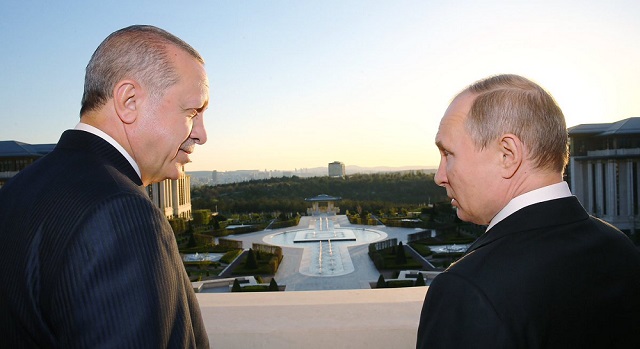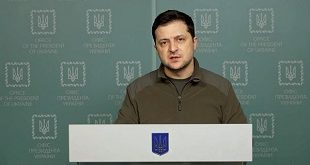
Ankara, Turkey | AFP | Russian President Vladimir Putin Tuesday launched the construction of Turkey’s first nuclear power station and vowed to accelerate the delivery of air defence systems to Ankara, in a new tightening of an increasingly close alliance that has alarmed NATO.
Putin held several hours of talks with Turkish counterpart Recep Tayyip Erdogan on the first of a two-day visit to Ankara that will see the two strongmen leaders joined on Wednesday by Iranian President Hassan Rouhani for a summit devoted to Syria.
Their meeting in Ankara opened with Putin and Erdogan, via video conference, talking about the construction of a nuclear power station in the Mediterranean Mersin region, a $20 billion project that will come online in half a decade.
Putin then said he and Erdogan had decided to “speed up” the delivery of S-400 air defence missile systems to Ankara, a purchase that has raised concerns among Turkey’s NATO partners.
Russian officials had said in December that the first deliveries in the $2 billion deal were likely to begin at the end of 2019 or beginning of 2020.
Putin and Erdogan — who have both led their post-imperial states out of economic crisis but also into a new era of confrontation with the West — have forged an increasingly close alliance in recent months.
In a sign of the importance of the partnership, Putin’s visit to Turkey is his first trip abroad since he won a historic fourth presidential mandate in March 18 polls.
– ‘Close cooperation’ –
Their meeting came as ties between Russia and the West are nosediving to post-Cold War lows after last month’s poisoning of Russian ex-double agent Sergei Skripal and his daughter in the UK.
While EU powers have rushed to join Britain in condemning Russia and expelling diplomats over the attack on Skripal, Turkey has been much more circumspect.
Erdogan, who in 2017 held eight face-to-face meetings with Putin and already spoke to the Russian leader seven times by phone this year, has said that Ankara will not act against Moscow “based on an allegation”.
But Ankara-Moscow relations were also tested by a severe crisis from November 2015 when Turkey shot down a Russian warplane over Syria, a confrontation both sides are trying to put behind them.
Despite being on different sides of the Syrian civil war, key regime backers Russia and Iran have joined with rebel-supporting Turkey to push forward a peace process but also to ensure influence in Syria once the conflict ends.
“God willing we will continue to work together… to establish Syria’s stability as well as its peace and security,” said Erdogan.
– ‘New stage for Turkey’ –
The Akkuyu power station — a project costing over $20 billion (16 billion euros) and greatly disliked by environmentalists — was already launched once before in February 2015 but then put on hold due to the row over the downed Russian plane.
“The scale of this project is difficult to exaggerate,” Putin said at the ceremony. “This marks a new stage in the development of Turkey’s economy.”
Erdogan declared: “We are witnessing a historic moment.”
The project was launched with Erdogan declaiming “in the name of God!” and work immediately began on the site, with the first concrete pouring as celebratory fireworks were set off.
Once completed the power station will provide 10 percent of the electricity needs of Turkey, which has few energy resources of its own. The first stage is due to come online in 2023, the 100th anniversary of modern Turkey’s founding, and be completed entirely in 2026.
Russia and Turkey are also building the TurkStream gas pipeline under the Black Sea that will allow Moscow to pump gas to Europe avoiding Ukraine and increase Turkey’s importance as a transit hub.
Half of the offshore section of the pipeline has already been installed.
Erdogan indicated that Turkey was in no mood to listen to criticism from the West over the purchase of the S-400 systems, saying “this issue is now closed.”
According to Russian press reports, Turkey has also been hugely interested in a technology transfer and even joint production of the S-400s with Russia, a prospect that has been resisted by some in the Moscow security services.
But Putin refused to discuss the issue saying “these are exclusively commercial questions” rather than political ones.
 The Independent Uganda: You get the Truth we Pay the Price
The Independent Uganda: You get the Truth we Pay the Price


